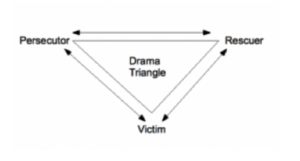You do it for the right reasons. You keep information from your boss because you're afraid he'll blow up. You let a non-performing employee get by with it because  she's had a rough year. Instead of confronting disruptive behavior from the bully in the workplace, you let it slide because she's a star performer.
she's had a rough year. Instead of confronting disruptive behavior from the bully in the workplace, you let it slide because she's a star performer.
The people in your workplace might be different, and the reasons might vary, but the situation is the same: You are the rescuer, and when you rescue, you contribute to the drama and workplace conflict.
In my book, Stop Workplace Drama, I introduce a tool, called The Karpman Drama Triangle. The idea is that when there is dysfunction you will see three roles being played out as illustrated by the diagram below.

Do you notice a theme in rescuing? It's justification. You have good reason for WHY you rescue. It's going to hurt someone's feelings. Someone has had a bad year. She's a star performer. To leave the rescue role, you must first identify the patterns.
Here are seven ways identify rescuing patterns:
How to Identify Rescuing
- Difficulty saying "no"
- Resentment toward others
- Hiding the truth to protect others
- Control freak
- Constant need to fix other people's problems
- The need to be the hero
- Doing other people's "emotional work."
If you want to stop your own rescuing patterns here are four practical steps you can take:
How to Stop Rescuing
- See the pattern you create by your thinking.
- Be willing to face the part you play in contributing to the dysfunction.
- Start seeing others as capable and competent.
- Contribute by building their skills through training, coaching and feedback, rather than rescuing.
What is the difference between rescuing and helping?
How often do you hide information to protect someone?
What do you get out of always being the hero?

Latest posts by Marlene Chism (see all)
- Leaders who Persecute Create Drama - June 20, 2017
- Four Things the Workplace Bully Can Teach You - January 13, 2013
- Leaders Who Rescue Create Drama - December 1, 2012













